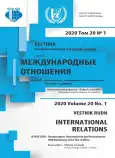Relations between USSR and the Democratic Republic of Congo at the Beginning of 1960s: Twists of History
- Authors: Sidorova G.M.1,2,3
-
Affiliations:
- Diplomatic Academy of the Russian Foreign Ministry
- Moscow State Linguistic University
- Institute for African Studies, RAS
- Issue: Vol 20, No 1 (2020): Decolonization, Neocolonialism and Recolonization: 60th Anniversary of the Year of Africa
- Pages: 197-209
- Section: BILATERIAL RELATIONS
- URL: https://journal-vniispk.ru/2313-0660/article/view/320202
- DOI: https://doi.org/10.22363/2313-0660-2020-20-1-197-209
- ID: 320202
Cite item
Full Text
Abstract
Since the establishment of diplomatic relations with Congo on July 7, 1960, the ties between USSR and Africa have faced a big challenge. During the difficult years for Congo, after liberation from colonial dependence, the Soviet Union has always advocated the country’s territorial integrity and the internal problems diplomatic solution. However, the bloodshed in Congo could not be avoided. Despite the Soviet support of the legitimate Congo government headed by P. Lumumba, the Western countries, which did not want to lose their positions in resource-rich Congo have found a way to achieve a victory. A military coup led by Joseph-Desire Mobutu took place in the country and national leader Patrice Lumumba was killed in consequence of a murder plot. Moreover, Western countries have managed to use the UN headed by Dag Hammarskjöld for their own purposes, and it only aggravated the situation in the country. The purpose of the study is to reveal the key points of Soviet-African relations in the most difficult period for Congo - the beginning of 1960s. Basing on the documents of the Russian Foreign Ministry, the fundamental works of Russian and foreign Africanist historians, as well as the author’s own work experience in a number of African countries, the author focuses on the analyses of the Soviet Union efforts during the decolonization years, which aim was to stabilize the situation and establish the legitimate rule in the country. The author applies a systematic approach to study political institutions of power, the author also rely on the historical method to study the change of political formations, and an event analysis approach to summarize the information collected about the specific political situation. The author comes to the conclusion that today Africans cooperate only with those who supports their national interests, maintains the security or sovereignty, and comes to the rescue in case of humanitarian disasters and climatic cataclysms. In contrast to 1960s, Africa from a backward continent turned into a full-fledged player on the world arena, occupying important positions in the system of international relations. The voice of African leaders is heard from the UN General Assembly. In this regard, it is important to formulate new approaches and concepts of interaction with African states giving them if not priority, then at least not the last place in the foreign policy of Russia.
Keywords
About the authors
Galina Mikhailovna Sidorova
Diplomatic Academy of the Russian Foreign Ministry; Moscow State Linguistic University; Institute for African Studies, RAS
Author for correspondence.
Email: gal_sid@mail.ru
PhD, Dr. of Sc. (Political Science), Professor, the Diplomatic Academy of Russian Foreign Ministry, Professor, the Moscow State Linguistic University, Leading Researcher, Institute for African Studies, Russian Academy of Science
Moscow, Russian FederationReferences
- Biyoya Makutu, Ph. (2009). La géopolitique de l’instabilité dans la région des Grands Lacs. P.: L’Harmattan.
- Denisova, T.S. (2016). Tropical Africa: The Evolution of Political Leadership. Moscow: IAS RAS publ. (In Russian).
- Heinz, G. & Donnay, H. (1967). Lumumba Patrice: les cinquante derniers jours de sa vie. Bruxelles: Seuil.
- Kabatu-Suila, B.E. (2004). Patrice Emery Lumumba, Béatifié! Kinshasa: Ed. KA-IMMO.
- Ki-Zerbo, J. (2008). Histoire de l’Afrique Noire. P.: Hatier.
- Lwambba, M.B. (2009). Les conflits à travers l’histoire du Congo de 1950 à 1965. In : République Démocratique du Congo: Parcours d’un demi-siele de souverainete. Université de Lubumbashi: Lubumbashi (RDC).P. 1—10.
- Mararo Stanislas, B. (2013). Le rôle des multinationals et des états des Grands Lacs d’Afrique dans la dinamique politiquqe en RDC. In: Kankwenda Mbaya, J. & Mukoka Nsenda, F. (Eds.). La République Démocratique du Congo face au complot de balkanisation et d’implosion. ICREDES. P. 231–260.
- Mazov, S. (2010). A Distant Front in the Cold War. The USSR in West Africa and the Congo, 1956—1964. Stanford: Stanford University Press.
- Mazov, S.V. (2008). Soviet Policy in West Africa, 1956—1964. Unknown Pages of the Cold War History. Moscow: Nauka publ. (In Russian).
- Mazov, S.V. (2015) Cold War in the “Heart of Africa”. USSR and Congolese Crisis 1960—1964. Moscow: Dmitry Pozharsky University publ. (In Russian).
- McCauley, M. (2016). Soviet Union 1917—1991. London: Longman.
- Mpwate-Ndaume, G. (2010). La coopération entre le Congo et les pays capitalistes. P.: L’Harmattan.
- Mutambo Makombo, J.M.K. (2008). L’Histoire du Congo par les textes. T. III: 1956—2003. Kinshasa: Universitaires Africaines.
- Nazhestkin, O.I. (2003). The Years of the Congolese Crisis (1960—1963). Notes by the Intelligence Agent. Modern and Current History Journal, 6, 154—164. (In Russian).
- O’Malley, A. (2019). The Diplomacy of Decolonisation: America, Britain and the United Nations during the Congo Crisis 1960—64. Manchester: Manchester University Press.
- Ponomarenko, L.V. (2010). Patrice Lumumba: An Unfinished Short Life Story. Moscow: RUDN publ. (In Russian).
- Ronin, V. (2009). “Russian Congo” 1870—1970. In 2 volumes. Vol. 2. Moscow: Dom russkogo zarubejya publ.
- Sadiki, K. (2013). Questions migratoires, inadéquation des réponses publiques et crise de nationalité en République Démocratique du Congo: le cas des banyarwanda. In : Ngoie Tshibambe, G. (Eds.). Identités, ressources naturelles et conflits en RDC. P.: L’Harmattan. P. 131—158.
- Urnov, A.Yu. (2014). Foreign Policy of the USSR during the Cold War and the “New Thinking”. Moscow: RFK-Image Lab publ. (In Russian).
- Vinokurov, Yu.N., Orlova, A.S. & Subbotin, V.A. (1982). History of Zaire in Modern and Contemporary Times. Moscow: Glavnaya redaktsiya vostochnoy literatury publ. (In Russian).
Supplementary files









